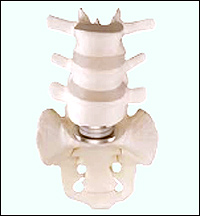Artificial Disc
High-Tech Artificial Spinal Disc Replacement Newest Treatment for an Aching Back
Physicians in the University of Maryland Department of Orthopaedics treat a complete range of spinal pathologies. Using a wide array of treatment modalities in a coordinated approach, physicians offer patients a full spectrum of treatment alternatives.
In addition to traditional methods, the most cutting-edge sophisticated surgical techniques are employed to return patients to the highest level of function possible.
Degenerative disc disease with low back pain is among the most common reasons for disability among adults.
Patients with degenerative disc disease in the lumbar spine have a choice of medical and surgical treatment options, including a new artificial disc called Charité™.
 Artificial knee and hip replacements may be commonplace, but Charité is the first spinal disc replacement approved by the FDA to treat patients with single-level degenerative disc disease.
Artificial knee and hip replacements may be commonplace, but Charité is the first spinal disc replacement approved by the FDA to treat patients with single-level degenerative disc disease.
In the past, surgical options for degenerative disc disease included traditional discectomy or spinal fusion surgery. Now, orthopaedic surgeons at the University of Maryland are using the Charité artificial spinal disc. It is a high-tech device made of metal and pliable plastic that allows patients to maintain flexibility. "It is the first motion preserving alternative to lumbar spinal fusion surgery," explains Daniel Gelb, MD, professor of orthopaedics at the University of Maryland School of Medicine. University of Maryland orthopaedic surgeons have been specially trained in using Charité.
Rear view of the lumbar spine with the Charité artificial disc.
Lumbar spinal fusion surgery is a common surgical treatment for low back pain or degenerative disc disease. While it is often effective in reducing pain, the surgery puts additional stress on the remaining mobile segments that may lead to adjacent segment degeneration and recurrence of symptoms.
"Results from a two year clinical study of 375 patients showed that those with the artificial disc improved or maintained their range of motion and experienced less pain sooner compared with patients who had spinal fusion," says Steven Ludwig, MD, assistant professor of orthopaedics at the University of Maryland School of Medicine. "Another advantage is that patients who have Charité have a faster recovery."
